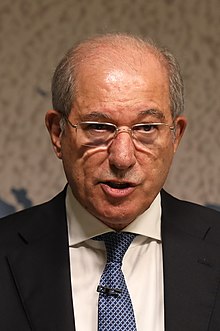Ahmet Üzümcü
Ahmet Üzümcü | |
|---|---|
 Üzümcü, 2018 | |
| Born | August 30, 1951 Armutlu, Yalova, İstanbul Province, Turkey |
| Nationality | Turkish |
| Education | Political science |
| Alma mater | Faculty of Political Science, Ankara University |
| Occupation | Diplomat |
| Spouse | Işıl Üzümcü |
Ahmet Üzümcü (born August 30, 1951) is a Turkish career diplomat, who previously served as the Director-General of the Organisation for the Prohibition of Chemical Weapons (OPCW).[1][2]
He graduated from Foreign Relations Department of the Faculty of Political Science, Ankara University.
Üzümcü was consul at the Consulate General in Aleppo, Syria, and ambassador to Israel from July 28, 1999, to June 30, 2002.[1] Between 2002 and 2004, he served as the Permanent Representative of Turkey to NATO.[1] Üzümcü was appointed Permanent Representative of Turkey to the United Nations Office at Geneva in 2006, serving at this post until 2010. In 2008, he became chair of the Conference on Disarmament.[3]
Üzümcü received an Honorary Doctorate for Lifetime Achievements in Arms Control and Disarmament from the Geneva School of Diplomacy in 2010 prior to taking up his position at the OPCW.[2]
In 2013, during Ahmet Üzümcü's mandate as Director-General, the Nobel Peace Prize was awarded to the OPCW.[4]
Ahmet Üzümcü is married to Işıl Üzümcü.[5] In 2016 he inaugurated the academic year of the master's course in International Affairs and Development – Peace Studies at Paris Dauphine University.[6]
In 2019, he was appointed Honorary Companion of the Order of St Michael and St George (CMG), for services to international diplomacy and the rule of law.[7]
He is a Senior Network Member at the European Leadership Network (ELN).[8]
References
[edit]- ^ a b c "NATO Permanent Representative of Turkey". NATO. 2004-11-25. Retrieved 2010-10-05.
- ^ a b "OPCW Director-General Ahmet Üzümcü". OPCW. 2010-09-06. Retrieved 2010-10-04.
- ^ "OPCW Chooses New Director-General". armscontrol.org. November 2009. Archived from the original on 19 October 2010. Retrieved 2010-10-04.
- ^ "Chemical weapons watchdog wins Nobel Peace Prize for Syrian mission". Reuters. 2013-10-11. Retrieved 2013-10-11.
- ^ "Diplomatic spouses". Diplomat Magazine. 28 September 2013. Archived from the original on 9 October 2021. Retrieved 11 October 2013.
- ^ "Accueil | Université Paris Dauphine-PSL".
- ^ "Honorary British Awards to Foreign Nationals – 2019".
- ^ "Senior Network". www.europeanleadershipnetwork.org. Retrieved 2020-09-21.
- 1951 births
- People from Armutlu, Yalova
- Ankara University Faculty of Political Sciences alumni
- 20th-century Turkish diplomats
- Ambassadors of Turkey to Israel
- Permanent Representatives of Turkey to NATO
- Permanent Representatives of Turkey to the United Nations
- Directors-general of the Organisation for the Prohibition of Chemical Weapons
- Living people
- Honorary companions of the Order of St Michael and St George
- 21st-century Turkish diplomats


